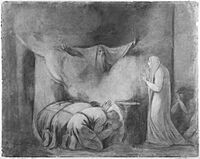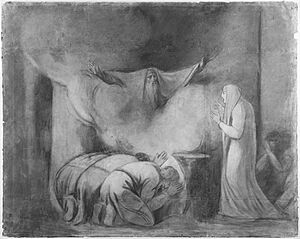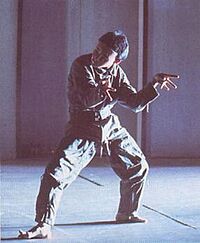The Persians facts for kids
Quick facts for kids The Persians |
|
|---|---|

Drawing by George Romney: The Ghost of Darius Appearing to Atossa
|
|
| Written by | Aeschylus |
| Chorus | Persian Elders |
| Characters | Atossa Messenger Ghost of Darius Xerxes |
| Date of premiere | 472 BC |
| Place of premiere | Athens |
| Original language | Ancient Greek |
| Setting | Susa |
The Persians (Ancient Greek: Πέρσαι, Persai) is a very old Greek play. It was written by a famous Greek writer named Aeschylus. He lived during the Classical period of Ancient Greece.
This play is the only one left from a group of three plays (a trilogy) that won first prize. This happened at a big festival in Athens called the City Dionysia in 472 BC. A man named Pericles helped organize it.
Contents
About Aeschylus and His Plays
Aeschylus wrote many plays, and sometimes they were connected. The Persians was part of a set of three plays. The first play was called Phineus. It was probably about Jason and the Argonauts saving King Phineus. The third play, Glaucus, might have been about a king eaten by horses or a farmer who became a sea god.
In The Persians, King Xerxes makes the gods angry. He does this by being too proud (this is called hubris) when he attacks Greece in 480/79 BC. The play mainly focuses on how Xerxes' navy was defeated at the Battle of Salamis. Aeschylus himself fought against the Persians at the Battle of Marathon in 490 BC. He might have even fought at Salamis, just eight years before he wrote this play!
After the three main plays, there was often a funny play called a satyr play. The satyr play for this trilogy was Prometheus Pyrkaeus. It was a comedy about the Titan Prometheus stealing fire.
What Happens in The Persians
The Persians takes place in Susa. This city was one of the capitals of the Persian Empire. The play starts with a group of old men from Susa, called the chorus. Soon, the Queen Mother, Atossa, joins them. They are all waiting for news about her son, King Xerxes, who went to fight the Greeks.
Atossa is very worried. She tells everyone about a strange dream she had. This is thought to be the first dream scene ever in European theater! An exhausted messenger then arrives. He tells a very detailed story about the terrible Battle of Salamis. He explains how the Persians lost and names the generals who were killed. He also says that Xerxes managed to escape and is coming home.
The messenger's speech ends with the powerful battle cry of the Greeks:
On, sons of Greece! Set free
Your fatherland, set free your children, wives,
Places of your ancestral gods and tombs of your ancestors!
Forward for all
At the tomb of her dead husband, King Darius, Atossa asks the chorus to call his ghost. They believe he might know a way to fix their problems. When Darius's ghost learns about the Persian defeat, he blames his son Xerxes' pride. He especially criticizes Xerxes for building a bridge over the Hellespont. This bridge was meant to help the Persian army move faster.
Before leaving, Darius's ghost predicts another Persian defeat. This will happen at the Battle of Plataea in 479 BC. He says: "Where the plain grows lush and green,/Where Asopus' stream plumps rich Boeotia's soil,/The mother of disasters awaits them there,/Reward for insolence, for scorning God."
Finally, Xerxes arrives. He is wearing torn clothes and is very upset about his huge defeat. The rest of the play shows the king and the chorus singing a sad song together. They mourn the enormous loss Persia has suffered.
How People See the Play
Aeschylus was not the first to write about the Persians. Another writer, Phrynichus, wrote two plays about them. One was called The Sack of Miletus (493 BC). It was about the destruction of a Greek city by the Persians. People were so sad and angry about this play that Phrynichus was fined! His other play, Phoenician Women (476 BC), was about the same event as Aeschylus's Persians. Neither of Phrynichus's plays still exist today.
People have different ideas about The Persians. Some think the play shows sympathy for the defeated Persians. Others believe it's a celebration of the Greek victory. The idea of sympathy is supported by old Greek thinkers like Aristotle. Most Greek tragedies try to make the audience feel for the characters. However, some argue that the play is part of a culture that didn't like foreigners. They might not have felt sorry for their enemy during a war. In the play, Xerxes himself says his pain is "a joy to my enemies."
Later Performances of The Persians
About 70 years after it was first performed, the play was put on again in Athens. The funny writer Aristophanes mentions it in his play The Frogs (405 BC). In it, Aeschylus says The Persians was "an effective sermon on the will to win. Best thing I ever wrote."
The Persians was also popular in the Roman Empire and Byzantine Empire. These empires also fought wars with the Persians. The play is still popular in modern Greece. In 1965, during a performance in Athens, the audience stood up and cheered, interrupting the actors!
Many directors have put on new versions of The Persians.
- In 1993, American director Peter Sellars created a version for the Edinburgh International Festival. This play was a response to the Gulf War of 1990–1991.
- In 2003, Ellen McLaughlin translated Persians for a theater in New York. This was a response to the invasion of Iraq.
- In 2010, Aaron Poochigian made a new translation. It included notes for the chorus's songs, showing which parts of the chorus should speak.
- Also in 2010, Kaite O'Reilly's translation was performed in a military training area in Wales. This made the audience think about the landscape, the local history, and the ancient Greek story.
- On July 25, 2020, for the 2500th anniversary of the Battle of Salamis, Persians was performed at the Ancient Theatre of Epidaurus. It was live-streamed around the world on YouTube. Actors spoke in both Ancient and Modern Greek, with English subtitles.
- The play was part of the 2022 Cambridge Greek Play.
- In March 2024, Dublin's Abbey Theatre staged the first Irish language translation of the play.
How The Persians Influenced Others
Aeschylus's play inspired other writers.
- Percy Bysshe Shelley's poem Hellas: A Lyrical Drama (1821) was based on The Persians.
- T. S. Eliot's famous poem The Waste Land has a line that sounds like a line from The Persians. Eliot wrote: "I had not thought Death had undone so many". This is similar to the messenger's line in The Persians: "However, you can be sure that so great a multitude of men never perished in a single day". It also sounds like a line from Dante's Inferno.
- In modern books, Dimitris Lyacos uses parts of the messenger's story from The Persians in his book Z213: Exit. He uses them to show a failed military mission and soldiers retreating after a war.
English Translations
Many people have translated The Persians into English over the years. Here are some of them:
- Robert Potter, 1777
- Anna Swanwick, 1886
- E. D. A. Morshead, 1908
- Walter George Headlam and C. E. S. Headlam, 1909
- Herbert Weir Smyth, 1922
- G. M. Cookson, 1922
- Gilbert Murray, 1939
- Seth G. Benardete, 1956
- Philip Vellacott, 1961
- Ted Hughes, 1971
- Janet Lembke and C.J. Herington, 1981
- Frederic Raphael and Kenneth McLeish, 1991
- Edith Hall, 1996
- Ellen McLaughlin, 2004
- George Theodoridis, 2009
- Aaron Poochigian, 2010
- Ian C. Johnston, 2012
- James Romm, 2016
 | Kyle Baker |
 | Joseph Yoakum |
 | Laura Wheeler Waring |
 | Henry Ossawa Tanner |



